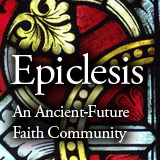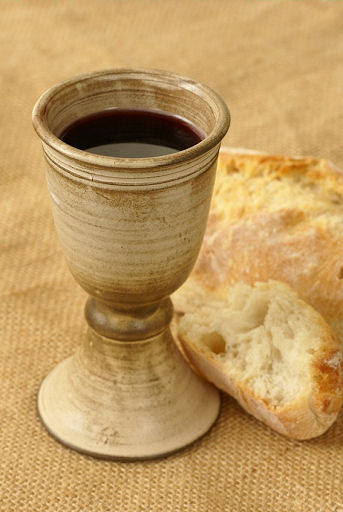 Here’s a good question for you– and it’s one that I would hope all members of our community of faith should be able to articulate when asked about Epiclesis: “What makes us an ancient-future church?”
Here’s a good question for you– and it’s one that I would hope all members of our community of faith should be able to articulate when asked about Epiclesis: “What makes us an ancient-future church?”
Now, sometimes when describing what something is, it’s also helpful to say what it is not, although I want us to be careful about that when the topic turns to church, lest we become smug (I once knew of a church that launched itself with a great marketing fanfare by telling the world that they were nothing like all those boring churches with the oldy-moldy music. Listen, churches that build on style will eventually find that they have become the oldy-moldy church they so badly wanted not to be. Nothing “dates” a church more than when it camps out in a particular style, even if it’s called “contemporary”. Besides, Simone Weil once said, “In order to always be relevant, say things that are eternal”).
So let me try to give you a bit of both: Both what we are and, by necessity at times, what we are not:
Ancient-Future is not a denominational affiliation. It is not a worship style. Ancient-Future is a worship theology— and I would point out that it’s a theology that goes beyond the Sunday worship event.
My mentor, Bob Webber, said that the “road to the future runs through the past”– that any meaningful living out of our faith in the here and now must engage the Tradition and practice of the early church and classic Christianity. Ancient-Future, to him, wasn’t some gimmick or latest fad, but rather a deep immersion in the common, refreshing waters of the well that is ancient faith and worship. Bob writes, “If you want a definition of ancient-future worship it is this: The common tradition of the church’s worship in Word, Table, and song, practiced faithfully and communicated clearly in every context of the world.”
So, what makes us Ancient-Future? What does this mean for us?
It means that we listen to and learn from the past. The modern church would say that old ways of doing things are ineffective, inefficient, or inferior. But the Holy Spirit has a history and we would do well to learn how He has moved and worked in the lives of our spiritual forebears. Epiclesis will draw upon the whole of church history– not one period or style– to inform and shape our worship and our faith.
 It means that we allow Scripture and God’s saving acts and deeds to order our steps. Epiclesis will follow the ancient practice of the Christian year, along with the discipline of the common Scripture lectionary, to keep our eyes and feet on a path of close communion with the person and work of Jesus and that we will mark the passing of time according to God’s saving acts and deeds rather than our own.
It means that we allow Scripture and God’s saving acts and deeds to order our steps. Epiclesis will follow the ancient practice of the Christian year, along with the discipline of the common Scripture lectionary, to keep our eyes and feet on a path of close communion with the person and work of Jesus and that we will mark the passing of time according to God’s saving acts and deeds rather than our own.
It means that we tell the whole story of God– from Creation to Consummation– in all of life, and most especially as a prayer that we lift up to God in worship. We recognize that we don’t so much invite God into our lives and story as much as we accept the invitation to join His. Epiclesis will affirm that it is God’s great story that shapes and gives meaning to all of life.
It means that we live life, and walk out our baptisms, in the reality that Christ’s work on the cross defeated the enemy— He redeemed not only me and you, but the whole of creation. Epiclesis will especially emphasize the classic, orthodox theology of “Christus Victor”, that Jesus Christ is Lord over all creation and that He overthrew and dethroned the powers and principalities.
 It means that in our worship, we ask the Holy Spirit to lift us up to participate in the ongoing communion between Father and Son. Jesus Christ is our King, Lamb, and High Priest and does for us what we cannot do for ourselves. It means that the historic content of word and Table– God’s ways of remembering His saving acts and deeds– stand at the center of our corporate worship. Epiclesis will attend to weekly teaching from God’s word and gathering around the Table where we expect to see the Word made flesh standing among us in His risen power.
It means that in our worship, we ask the Holy Spirit to lift us up to participate in the ongoing communion between Father and Son. Jesus Christ is our King, Lamb, and High Priest and does for us what we cannot do for ourselves. It means that the historic content of word and Table– God’s ways of remembering His saving acts and deeds– stand at the center of our corporate worship. Epiclesis will attend to weekly teaching from God’s word and gathering around the Table where we expect to see the Word made flesh standing among us in His risen power.
If you would like to learn more about Ancient-Future worship, I would commend the book of the same title by Bob Webber; and also carefully read the “Call to An Ancient-Evangelical Future”, both resources that we consider foundational to who we are at Epiclesis. Of course, I would also love to keep the conversation going, so please let me know if you have questions or comments. It’s a joy to be in community– an Ancient-Future community— with you.
Pastor Chris